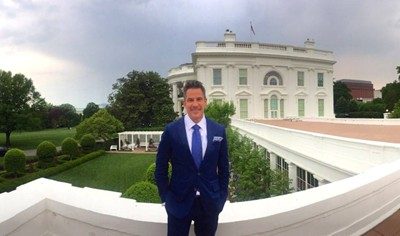White House
Biden announces student loan debt relief program
The President’s plan calls for forgiving up to $10,000 in federal student debt for Americans who earn less than $125,000 a year
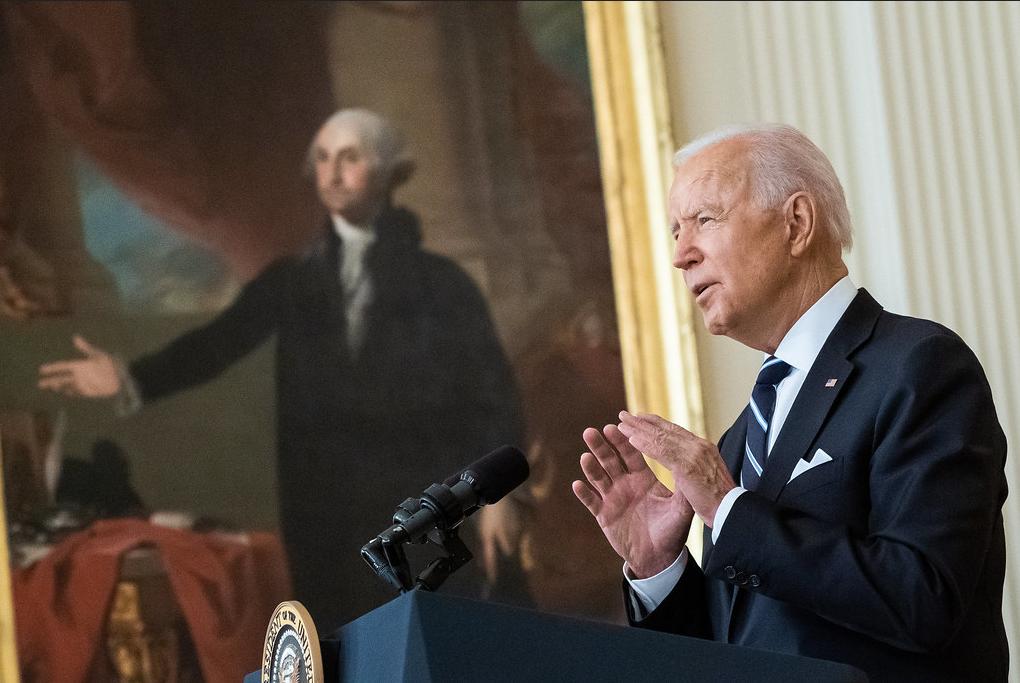
WASHINGTON – President Biden on Wednesday announced a series of actions aimed at reducing student loan debt burdens on thousands of Americans. The President’s plan calls for forgiving up to $10,000 in federal student debt for Americans who earn less than $125,000 a year and $20,000 for Pell grant recipients, as well as extending the federal moratorium on student loan debt payments through December 31st.
In keeping with my campaign promise, my Administration is announcing a plan to give working and middle class families breathing room as they prepare to resume federal student loan payments in January 2023.
— President Biden (@POTUS) August 24, 2022
I’ll have more details this afternoon. pic.twitter.com/kuZNqoMe4I
California U.S. Senator Alex Padilla reacted to Biden’s announcement saying in a statement:
“I applaud President Biden’s historic decision to forgive thousands of dollars in student loan debt, target much needed support to low-income students and graduates, and extend the pause on payments. For too long, students have shouldered overwhelming student loan debt just to get a fighting chance at the American Dream. Facing tens of thousands of dollars in debt, millions of young Americans spend decades under the weight of significant loan payments—or worse, the devastation of default. But today, hardworking Americans won.
“First-generation students and communities of color will now be able to better save for their future and build wealth. Young families will have more flexibility to pay for essentials like childcare, rent, transportation, and food. And tens of millions of Americans will be able to put more of their hard-earned paychecks back into the economy—benefiting everyone.”
The President, accompanied by U.S. Education Miguel Cardona, spoke with reporters in the Roosevelt Room in the West Wing Wednesday afternoon. According to White House Press Pool reporter Maureen Groppe, the White House Correspondent for USA TODAY, Biden recounted how his father was ashamed that he couldn’t borrow the money for Biden’s college education. Biden said his father believed, as he does, that education is the ticket to a better way of life. But over time that ticket has become too expensive.
He said the debt burden is particularly hard on Black & Hispanic borrowers.
“Now it’s time to address the burden of student debt,” he said.
Biden said his actions honor his campaign promises.
“All this means people can finally start crawling out of that mountain of debt,” he said. “When this happens, the whole economy is better off. “
He said the changes provide real benefits for families without a meaningful effect on inflation.
“It’s a game changer,” he said of permanent changes to loan programs.
He said the administration will hold colleges accountable for jacking up costs.
“Our goal is to shine a light on the worst actors,” he said.
Some will think his plan is too much & others will think it’s not enough, he said.
“I believe my plan is responsible & fair…will fix a badly broken system,” he said.
He said he will continue to fight for doubling Pell Grants.
Earlier on Wednesday the White House released details via a press release of the administration’s plan:
This plan offers targeted debt relief as part of a comprehensive effort to address the burden of growing college costs and make the student loan system more manageable for working families. The President is announcing that the Department of Education will:
- Provide targeted debt relief to address the financial harms of the pandemic, fulfilling the President’s campaign commitment. The Department of Education will provide up to $20,000 in debt cancellation to Pell Grant recipients with loans held by the Department of Education, and up to $10,000 in debt cancellation to non-Pell Grant recipients. Borrowers are eligible for this relief if their individual income is less than $125,000 ($250,000 for married couples). No high-income individual or high-income household – in the top 5% of incomes – will benefit from this action. To ensure a smooth transition to repayment and prevent unnecessary defaults, the pause on federal student loan repayment will be extended one final time through December 31, 2022. Borrowers should expect to resume payment in January 2023.
- Make the student loan system more manageable for current and future borrowers by:
- Cutting monthly payments in half for undergraduate loans. The Department of Education is proposing a new income-driven repayment plan that protects more low-income borrowers from making any payments and caps monthly payments for undergraduate loans at 5% of a borrower’s discretionary income—half of the rate that borrowers must pay now under most existing plans. This means that the average annual student loan payment will be lowered by more than $1,000 for both current and future borrowers.
- Fixing the broken Public Service Loan Forgiveness (PSLF) program by proposing a rule that borrowers who have worked at a nonprofit, in the military, or in federal, state, tribal, or local government, receive appropriate credit toward loan forgiveness. These improvements will build on temporary changes the Department of Education has already made to PSLF, under which more than 175,000 public servants have already had more than $10 billion in loan forgiveness approved.
- Cutting monthly payments in half for undergraduate loans. The Department of Education is proposing a new income-driven repayment plan that protects more low-income borrowers from making any payments and caps monthly payments for undergraduate loans at 5% of a borrower’s discretionary income—half of the rate that borrowers must pay now under most existing plans. This means that the average annual student loan payment will be lowered by more than $1,000 for both current and future borrowers.
- Protect future students and taxpayers by reducing the cost of college and holding schools accountable when they hike up prices. The President championed the largest increase to Pell Grants in over a decade and one of the largest one-time influxes to colleges and universities. To further reduce the cost of college, the President will continue to fight to double the maximum Pell Grant and make community college free. Meanwhile, colleges have an obligation to keep prices reasonable and ensure borrowers get value for their investments, not debt they cannot afford. This Administration has already taken key steps to strengthen accountability, including in areas where the previous Administration weakened rules. The Department of Education is announcing new efforts to ensure student borrowers get value for their college costs.
Provide Targeted Debt Relief, Fulfilling the President’s Campaign Commitment
To address the financial harms of the pandemic for low- and middle-income borrowers and avoid defaults as loan repayment restarts next year, the Department of Education will provide up to $20,000 in loan relief to borrowers with loans held by the Department of Education whose individual income is less than $125,000 ($250,000 for married couples) and who received a Pell Grant. Nearly every Pell Grant recipient came from a family that made less than $60,000 a year, and Pell Grant recipients typically experience more challenges repaying their debt than other borrowers. Borrowers who meet those income standards but did not receive a Pell Grant in college can receive up to $10,000 in loan relief.

The Pell Grant program is one of America’s most effective financial aid programs—but its value has been eroded over time. Pell Grant recipients are more than 60% of the borrower population. The Department of Education estimates that roughly 27 million borrowers will be eligible to receive up to $20,000 in relief, helping these borrowers meet their economic potential and avoid economic harm from the COVID-19 pandemic.
Current students with loans are eligible for this debt relief. Borrowers who are dependent students will be eligible for relief based on parental income, rather than their own income.
If all borrowers claim the relief they are entitled to, these actions will:
- Provide relief to up to 43 million borrowers, including cancelling the full remaining balance for roughly 20 million borrowers.
- Target relief dollars to low- and middle-income borrowers. The Department of Education estimates that, among borrowers who are no longer in school, nearly 90% of relief dollars will go to those earning less than $75,000 a year. No individual making more than $125,000 or household making more than $250,000 – the top 5% of incomes in the United States – will receive relief.
- Help borrowers of all ages. The Department of Education estimates that, among borrowers who are eligible for relief, 21% are 25 years and under and 44% are ages 26-39. More than a third are borrowers age 40 and up, including 5% of borrowers who are senior citizens.
- Advance racial equity. By targeting relief to borrowers with the highest economic need, the Administration’s actions are likely to help narrow the racial wealth gap. Black students are more likely to have to borrow for school and more likely to take out larger loans. Black borrowers are twice as likely to have received Pell Grants compared to their white peers. Other borrowers of color are also more likely than their peers to receive Pell Grants. That is why an Urban Institute study found that debt forgiveness programs targeting those who received Pell Grants while in college will advance racial equity.

The Department of Education will work quickly and efficiently to set up a simple application process for borrowers to claim relief. The application will be available no later than when the pause on federal student loan repayments terminates at the end of the year. Nearly 8 million borrowers may be eligible to receive relief automatically because their relevant income data is already available to the Department.
Thanks to the American Rescue Plan, this debt relief will not be treated as taxable income for the federal income tax purposes.
To help ensure a smooth transition back to repayment, the Department of Education is extending the student loan pause a final time through December 31, 2022. No one with federally-held loans has had to pay a single dollar in loan payments since President Biden took office.
Make the Student Loan System More Manageable for Current and Future Borrowers
Fixing Existing Loan Repayment to Lower Monthly Payments
The Administration is reforming student loan repayment plans so both current and future low- and middle-income borrowers will have smaller and more manageable monthly payments.
The Department of Education has the authority to create income-driven repayment plans, which cap what borrowers pay each month based on a percentage of their discretionary income. Most of these plans cancel a borrower’s remaining debt once they make 20 years of monthly payments. But the existing versions of these plans are too complex and too limited. As a result, millions of borrowers who might benefit from them do not sign up, and the millions who do sign up are still often left with unmanageable monthly payments.
To address these concerns and follow through on Congress’ original vision for income-driven repayment, the Department of Education is proposing a rule to do the following:
- For undergraduate loans, cut in half the amount that borrowers have to pay each month from 10% to 5% of discretionary income.
- Raise the amount of income that is considered non-discretionary income and therefore is protected from repayment, guaranteeing that no borrower earning under 225% of the federal poverty level—about the annual equivalent of a $15 minimum wage for a single borrower—will have to make a monthly payment.
- Forgive loan balances after 10 years of payments, instead of 20 years, for borrowers with original loan balances of $12,000 or less. The Department of Education estimates that this reform will allow nearly all community college borrowers to be debt-free within 10 years.
- Cover the borrower’s unpaid monthly interest, so that unlike other existing income-driven repayment plans, no borrower’s loan balance will grow as long as they make their monthly payments—even when that monthly payment is $0 because their income is low.
These reforms would simplify loan repayment and deliver significant savings to low- and middle-income borrowers. For example:
- A typical single construction worker (making $38,000 a year) with a construction management credential would pay only $31 a month, compared to the $147 they pay now under the most recent income-driven repayment plan, for annual savings of nearly $1,400.
- A typical single public school teacher with an undergraduate degree (making $44,000 a year) would pay only $56 a month on their loans, compared to the $197 they pay now under the most recent income-driven repayment plan, for annual savings of nearly $1,700.
- A typical nurse (making $77,000 a year) who is married with two kids would pay only $61 a month on their undergraduate loans, compared to the $295 they pay now under the most recent income-driven repayment plan, for annual savings of more than $2,800.

For each of these borrowers, their balances would not grow as long as they are making their monthly payments, and their remaining debt would be forgiven after they make the required number of qualifying payments.
Further, the Department of Education will make it easier for borrowers who enroll in this new plan to stay enrolled. Starting in the summer of 2023, borrowers will be able to allow the Department of Education to automatically pull their income information year after year, avoiding the hassle of needing to recertify their income annually.
Ensuring Public Servants Receive Credit Toward Loan Forgiveness
Borrowers working in public service are entitled to earn credit toward debt relief under the Public Service Loan Forgiveness (PSLF) program. But because of complex eligibility restrictions, historic implementation failures, and poor counseling given to borrowers, many borrowers have not received the credit they deserve for their public service.
The Department of Education has announced time-limited changes to PSLF that provide an easier path to forgiveness of all outstanding debt for eligible federal student loan borrowers who have served at a non-profit, in the military, or in federal, state, Tribal, or local government for at least 10 years, including non-consecutively. Those who have served less than 10 years may now more easily get credit for their service to date toward eventual forgiveness. These changes allow eligible borrowers to gain additional credit toward forgiveness, even if they had been told previously that they had the wrong loan type.
The Department of Education also has proposed regulatory changes to ensure more effective implementation of the PSLF program moving forward. Specifically, the Department of Education has proposed allowing more payments to qualify for PSLF including partial, lump sum, and late payments, and allowing certain kinds of deferments and forbearances, such as those for Peace Corps and AmeriCorps service, National Guard duty, and military service, to count toward PSLF. The Department of Education also proposed to ensure the rules work better for non-tenured instructors whose colleges need to calculate their full-time employment.
To ensure borrowers are aware of the temporary changes, the White House has launched four PSLF Days of Action dedicated to borrowers in specific sectors: government employees, educators, healthcare workers and first responders, and non-profit employees. You can find out other information about the temporary changes on PSLF.gov. You must apply to PSLF before the temporary changes end on October 31, 2022.
Protecting Borrowers and Taxpayers from Steep Increases in College Costs
While providing this relief to low- and middle-income borrowers, the President is focused on keeping college costs under control. Under this Administration, students have had more money in their pockets to pay for college. The President signed the largest increase to the maximum Pell Grant in over a decade and provided nearly $40 billion to colleges and universities through the American Rescue Plan, much of which was used for emergency student financial aid, allowing students to breathe a little easier.
Additionally, the Department of Education has already taken significant steps to strengthen accountability, so that students are not left with mountains of debt with little payoff. The agency has re-established the enforcement unit in the Office of Federal Student Aid and it is holding accreditors’ feet to the fire. In fact, the Department just withdrew authorization for the accreditor that oversaw schools responsible for some of the worst for-profit scandals. The agency will also propose a rule to hold career programs accountable for leaving their graduates with mountains of debt they cannot repay, a rule the previous Administration repealed.
Building off of these efforts, the Department of Education is announcing new actions to hold accountable colleges that have contributed to the student debt crisis. These include publishing an annual watch list of the programs with the worst debt levels in the country, so that students registering for the next academic year can steer clear of programs with poor outcomes. They also include requesting institutional improvement plans from the worst actors that outline how the colleges with the most concerning debt outcomes intend to bring down debt levels.

U.S. Citizenship and Immigration Services on Monday announced it will ensure “male aliens seeking immigration benefits aren’t coming to the U.S. to participate in women’s sports.”
The announcement notes USCIS “has clarified eligibility for certain visa categories: O-1A aliens of extraordinary ability, E11 aliens of extraordinary ability, E21 aliens of exceptional ability, and for national interest waivers (NIWs), to guarantee an even playing field for all women’s athletics in the United States.” The new policy comes roughly six months after President Donald Trump issued an executive order that bans transgender women and girls from female sports teams in the U.S.
“Men do not belong in women’s sports. USCIS is closing the loophole for foreign male athletes whose only chance at winning elite sports is to change their gender identity and leverage their biological advantages against women,” said USCIS spokesperson Matthew Tragesser. “It’s a matter of safety, fairness, respect, and truth that only female athletes receive a visa to come to the U.S. to participate in women’s sports.”
“The Trump administration is standing up for the silent majority who’ve long been victims of leftist policies that defy common sense,” added Tragesser.
USCIS in April announced it will only recognize “two biological sexes, male and female.” Trump shortly after he took office for a second time on Jan. 20 signed the “Defending Women from Gender Ideology Extremism and Restoring Biological Truth to the Federal Government” executive order.
The 2028 Summer Olympics will take place in Los Angeles.
The U.S. Olympic and Paralympic Committee last month banned trans women from competing in women’s sporting events.
The Guardian earlier this year reported the State Department ordered consular officials “to deny visas to transgender athletes attempting to come to the U.S. for sports competitions, and to issue permanent visa bans against those who are deemed to misrepresent their birth sex on visa applications.”
Germany and Denmark are among the countries that have issued travel advisory for trans and nonbinary people who are planning to visit the U.S. The warnings specifically note the Trump-Vance administration has banned the State Department from issuing passports with “X” gender markers.
“This policy update clarifies that USCIS considers the fact that a male athlete has been competing against women as a negative factor in determining whether the alien is among the small percentage at the very top of the field,” reads the USCIS announcement. “USCIS does not consider a male athlete who has gained acclaim in men’s sports and seeks to compete in women’s sports in the United States to be seeking to continue work in his area of extraordinary ability; male athletes seeking to enter the country to compete in women’s sports do not substantially benefit the United States; and it is not in the national interest to the United States to waive the job offer and, thus, the labor certification requirement for male athletes whose proposed endeavor is to compete in women’s sports.”
The new USCIS guidance takes effect immediately.
White House
DOJ launches investigation into Calif. trans student-athlete policy
State AG vows to defend Golden State laws
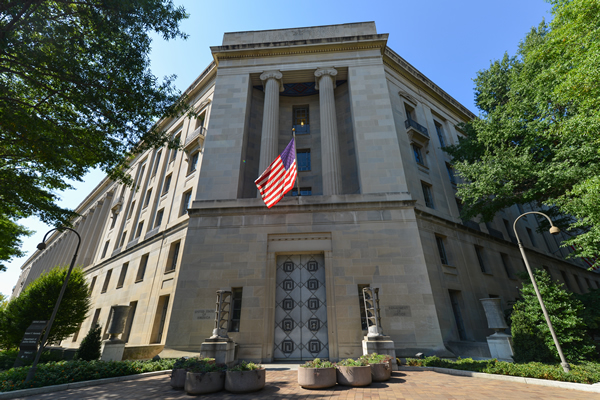
One day after President Donald Trump threatened to strip California of “large scale federal funding” over its policy on transgender student-athletes, his Justice Department announced it is investigating the state for potentially violating Title IX.
“The investigation is to determine whether California, its senior legal, educational, and athletic organizations, and the school district are engaging in a pattern or practice of discrimination on the basis of sex,” the DOJ said in a statement.
The DOJ said it notified State Attorney General Rob Bonta, State Superintendent of Public Instruction Tony Thurmond, the Jurupa Unified School District, and the California Interscholastic Federation of its investigation.
AB Hernandez, 16, is an out trans female student-athlete at Jurupa Valley High School who qualified for this weekend’s state track and field championship. As the Los Angeles Blade reported earlier this week, the CIF announced a change in the rules at the finals to accommodate girls who were displaced by Hernandez, including giving medals to cisgender competitors who earn a podium spot should Hernandez place ahead of them.
“We remain committed to defending and upholding California laws and all additional laws which ensure the rights of students, including transgender students, to be free from discrimination and harassment,” said Bonta in a statement. “We will continue to closely monitor the Trump administration’s actions in this space.”
As KTLA reported, California is one of 22 states that allow trans student-athletes to participate in sports consistent with their gender identity. Former Gov. Jerry Brown signed that policy into law in 2013.
The DOJ announced it is also now supporting a federal lawsuit targeting Bonta and the state Department of Education, claiming that California law and CIF policy discriminate against cisgender girls by allowing trans female athletes to compete according to their gender identity.
The lawsuit was filed by a conservative law group, Advocates for Faith and Freedom, representing the families of two girls at Martin Luther King High School in Riverside. Their suit claims the school’s cross-country team dropped one athlete from her varsity spot in favor of a trans athlete and that school administrators compared their “Save Girls Sports” T-shirts to swastikas.
Officials in Washington also weighed-in, referring to trans girls and women as “males.”
“Title IX exists to protect women and girls in education,” said Assistant U.S. Attorney General for Civil Rights Harmeet K. Dhillon. “It is perverse to allow males to compete against girls, invade their private spaces, and take their trophies.”
“The law is clear: Discrimination on the basis of sex is illegal and immoral,” said U.S. Attorney Bill Essayli. “My office and the rest of the Department of Justice will work tirelessly to protect girls’ sports and stop anyone — public officials included — from violating women’s civil rights.”
According to Gov. Gavin Newsom’s office, out of the 5.8 million students in California’s K-12 public school system, the number of active trans student-athletes is estimated to be in the single digits.
Politics
Trump bars trans women and girls from sports
The administration reversed course on the Biden-Harris policy on Title IX

President Donald Trump on Wednesday issued another executive order taking aim at the transgender community, this time focusing on eligibility for sports participation.
In a signing ceremony for “Keeping Men Out of Women’s Sports” in the East Room of the White House, the president proclaimed “With this executive order, the war on women’s sports is over.”
Despite the insistence by Trump and Republicans that trans women and girls have a biological advantage in sports over cisgender women and girls, the research has been inconclusive, at best.
A study in the peer reviewed Sports Medicine journal found “no direct or consistent research” pointing to this conclusion. A different review in 2023 found that post-pubertal differences are “reduced, if not erased, over time by gender affirming hormone therapy.”
Other critics of efforts to exclude trans student athletes have pointed to the small number of people who are impacted. Charlie Baker, president of the National Collegiate Athletic Association, testified last year that fewer than 10 of the NCAA’s 522,000+ student athletes identify as trans.
The Trump-Vance administration has reversed course from the Biden-Harris administration’s policy on Title IX rules barring sex-based discrimination.
“If you’re going to have women’s sports, if you’re going to provide opportunities for women, then they have to be equally safe, equally fair, and equally private opportunities, and so that means that you’re going to preserve women’s sports for women,” a White House official said prior to the issuance of the order.
Former President Joe Biden’s Title IX rules, which went into effect last year, clarified that pursuant to the U.S. Supreme Court’s ruling in Bostock v. Clayton County (2020), sex-based discrimination includes that which is based on the victim’s sexual orientation or gender identity.
The White House official indicated that the administration will consider additional guidance, regulations, and interpretations of Title IX, as well as exploring options to handle noncompliance by threatening federal funding for schools and education programs.
White House Press Secretary Karoline Leavitt told reporters that Trump “does expect the Olympic Committee and the NCAA to no longer allow men to compete in women’s sports.”
One of the first legislative moves by the new Congress last month was House Republicans’ passage of the “Protection of Women and Girls in Sports Act,” which would ban trans women and girls from participating in competitive athletics.
The bill is now before the U.S. Senate, where Republicans have a three-seat majority but would need 60 votes to overcome the filibuster.
White House
Trump signs order to restrict gender-affirming health care for minors
HRC and Congressional Equality Caucus denounced the move

President Donald Trump on Tuesday signed an executive order barring gender-affirming health care for minors, the latest action by the newly seated administration that takes aim at the rights and protections of transgender Americans.
The executive order, which prohibits the federal government from engaging in activities to “fund, sponsor, promote, assist, or support” trans medicine for patients younger than 19, is based on arguments that these treatments lead to financial hardship and regret later in life.
In reality, scientific and medical organizations publish and maintain clinical practice guidelines on gender-affirming care that are based on hundreds of peer reviewed studies assessing the relative risks and benefits associated with each intervention.
“Everyone deserves the freedom to make deeply personal health care decisions for themselves and their families — no matter your income, zip code, or health coverage,” said Human Rights Campaign President Kelley Robinson. “This executive order is a brazen attempt to put politicians in between people and their doctors, preventing them from accessing evidence-based health care supported by every major medical association in the country.”
Robinson added, “It is deeply unfair to play politics with people’s lives and strip transgender young people, their families, and their providers of the freedom to make necessary health care decisions. Questions about this care should be answered by doctors — not politicians — and decisions must rest with families, doctors, and the patient.”
HRC noted that in practical terms, the federal government will effectuate this policy by taking such actions as “removing coverage for gender-affirming care from federal health insurance policies, modifying requirements under the Affordable Care Act, and preventing hospitals or other medical providers who accept Medicare or Medicaid, or who receive federal funding for research or education, from providing gender-affirming care of any kind to people under the age of 19.”
“This executive order to deny young transgender people access to the evidence-based, medically-necessary and often lifesaving care they need is an attempt by Donald Trump to insert himself into doctors’ offices across the country and override their medical judgment,” said U.S. Rep. Mark Takano (D-Calif.), chair of the Congressional Equality Caucus.
“Decisions about a young person’s healthcare belong with the patient, their families, and their doctors,” he added. “Politicians should not be overriding the private medical decisions of any person, period.”
White House
Senate confirms gay Treasury secretary nominee Scott Bessent
Hedge fund manager confirmed by 68-29 vote margin

The U.S. Senate on Monday confirmed President Donald Trump’s pick for Treasury secretary, openly gay hedge fund manager Scott Bessent.
Overcoming opposition from some economically progressive Senate Democrats like Elizabeth Warren (Mass.) and Ron Wyden (Ore.), the nominee was confirmed by vote of 68-29.
Bessent during his hearing said that extending tax cuts that were passed during Trump’s first administration with the 2017 Tax Cuts and Jobs Act but are slated to expire in 2025 will be a top priority.
“This is pass-fail, that if we do not fix these tax cuts, if we do not renew and extend, then we will be facing an economic calamity,” he told the senators.
“Today, I believe that President Trump has a generational opportunity to unleash a new economic golden age that will create more jobs, wealth and prosperity for all Americans,” Bessent said at his confirmation hearing.
According to Fortune Magazine, Bessent, who is a billionaire, disclosed assets worth an estimated $521 million.
He will be the second openly gay man to serve in the Cabinet, after Biden-Harris administration Transportation Secretary Pete Buttigieg, and in a Cabinet-level office, after Obama-Biden administration Acting U.S. Trade Representative Demetrios Marantis and Trump-Pence administration Acting Director of National Intelligence Ric Grenell.
White House
Trump immigration policies ‘will cost lives’
Groups that work with LGBTQ+ migrants, asylum seekers condemn White House EOs

Groups that work with LGBTQ+ migrants and asylum seekers have condemned the Trump-Vance administration over its immigration policies.
President Donald Trump shortly after his Jan. 20 inauguration signed several immigration-specific executive orders. They include:
• Declaring a national emergency on the Southern border
• Suspending the U.S. Refugee Admissions Program
• Ending birthright citizenship under the 14th amendment. (U.S. District Judge John Coughenour, who Ronald Reagan appointed, in a Jan. 23 ruling described the directive as “blatantly unconstitutional.”)
Trump has reinstated the Migrant Protection Protocols program, also known as the “Remain in Mexico” policy that forced asylum seekers to pursue their cases in Mexico. The White House on Jan. 20 also shut down the CBP (U.S. Customs and Border Protection) One app that asylum seekers used to schedule appointments that would allow them to enter the U.S. at ports of entry.
A press release the Department of Homeland Security issued on Jan. 21 issued notes the Trump-Vance administration has ended “the broad abuse of humanitarian parole” for undocumented migrants. Immigration and Customs Enforcement and CBP agents can also make arrests in schools, churches, and other so-called “sensitive” areas.
An ICE press release notes the agency, the U.S. Marshals Service and other federal agencies on Sunday “began conducting enhanced targeted operations” in Chicago “to enforce U.S. immigration law and preserve public safety and national security by keeping potentially dangerous criminal aliens out of our communities.”
ICE on X said its agents arrested 956 people on Sunday across the country. NBC Washington reported ICE Enforcement and Removal Operations personnel on Sunday morning were at a Fairfax County apartment building, but it is not clear whether they took anyone into custody.
A second press release that ICE issued on Jan. 23 notes the arrest of an undocumented Mexican man in Houston who was wanted for the “rape of a child” in Veracruz, Mexico. Mexican authorities took him into custody after ICE officials returned him to his country of origin.
“We now have a government that cannot manage even a simple crisis at home while, at the same time, stumbling into a continuing catalogue of catastrophic events abroad,” said Trump in his inaugural address.
“It fails to protect our magnificent, law-abiding American citizens, but provides sanctuary and protection for dangerous criminals, many from prisons and mental institutions, that have illegally entered our country from all over the world,” he added.
Immigration Equality Executive Director Aaron C. Morris on Jan. 22 said Trump’s “agenda to detain, deport, and dehumanize people is an affront to fundamental American values.”
“The executive orders will cost lives, separate families, and trap queer people in extreme danger,” he said. “They are an overt, illegal power grab with mortal consequences for LGBTQ people seeking safety in the United States.”
Then-Vice President Kamala Harris and others in the previous administration acknowledged violence based on sexual orientation and gender identity is among the “root causes” of migration from the Central American countries of Guatemala, El Salvador, and Honduras. (Morris is among the activists who sharply criticized the Biden-Harris administration over policies they said restricted LGBTQ people and people with HIV from seeking asylum in the U.S.)
“The Trump administration’s recent executive orders targeting asylum seekers, refugees, and immigrants while escalating attacks on the LGBTIQ community are unethical, un-American, and jeopardize countless lives,” Organization for Refuge, Asylum and Migration Executive Director Steve Roth told the Los Angeles Blade in a statement. “By barring asylum and suspending refugee programs, these policies strip away fundamental human rights and protections, directly threatening LGBTIQ refugees who already endure persecution, xenophobia, homophobia, transphobia, and systematic inequality.”
Familia: TQLM, an organization that advocates on behalf of transgender and gender non-conforming immigrants, was even more pointed in a statement it posted to its Facebook page shortly after Trump’s inauguration.
“On Jan. 20, we resist,” said Familia: TQLM. “This is not a day to give into fear, but a day to reclaim our power.”
“Trans and queer immigrant people have endured through regimes that sought to erase, silence, and destroy us,” it added. “Yet, we remain.”
Casa Frida, which works with LGBTQ+ migrants and asylum seekers in Mexico City, in a Jan. 20 post to its X account said it will continue to work with the aforementioned groups with the support of local officials.
“We are preparing ourselves to continue working with love and solidarity in favor of LGBTIQ communities, migrants and displaced people,” said Casa Frida. “Our programs are reorganized and coordinated with local governments with pride, dignity and without fear or shame of who we are.”
Ante los esperados cambios políticos; Estamos preparándonos para seguir adelante trabajando con amor y solidaridad en favor de las comunidades y personas LGBTIQ migrantes y desplazadas. Nuestros programas se reorganizan y coordinan con gobiernos locales. Con orgullo, dignidad y…
— Refugio LGBTIQ 🏳️🌈🏳️⚧️🇲🇽 (@CasaFridaLGBT) January 20, 2025
White House
Trump’s first week in office sees flurry of anti-LGBTQ+ executive actions
Issuance of two orders and rescission of seven specifically targeted the LGBTQ+ community

On the first day and in the first week of his second term, President Donald Trump issued two executive orders taking aim specifically at LGBTQ+ people while rescinding seven actions by the Biden-Harris administration that expanded rights and protections for the community.
As detailed by the Human Rights Campaign, the anti-trans order, titled “Defending Women From Gender Ideology Extremism and Restoring Biological Truth to the Federal Government,” would prohibit the federal government from recognizing people and populations whose birth sex does not match their gender identity, while facilitating discrimination against LGBTQ+ communities “in the workplace, education, housing, healthcare, and more.”
Additionally, the order directs the attorney general to allow “people to refuse to use a transgender or nonbinary person’s correct pronouns, and to claim a right to use single-sex bathrooms and other spaces based on sex assigned at birth at any workplace covered by the Civil Rights Act of 1964 and federally funded spaces.”
The U.S. Departments of State and Homeland Security are further instructed to stop issuing documents like passports, visas, and Global Entry cards that conflict with the new, restrictive definition of sex that excludes consideration of trans and gender diverse identities.
The order also would prohibit federal funding, including through grants and contracts, for any content that is believed to promote “gender ideology,” while implementing restrictions on the use of federal resources to collect data on matters concerning gender identity.
There would also be consequences for particularly vulnerable populations, such as rules prohibiting trans women from accessing domestic violence shelters, forcing trans women to be housed with men in prisons and detention facilities, and prohibiting correctional facilities from providing gender affirming healthcare of any kind.
The second executive order targeting LGBTQ+ people would end diversity, equity, and inclusion programs across the federal government. HRC points out that “The preamble to the order includes a mention of the Project 2025 trope ‘gender ideology,’ while the language does not actually define DEI — meaning that “confusion and differing understandings of what DEI entails are likely to extend the regulatory process and may, in the meantime, have a chilling effect on any efforts that could potentially be considered ‘DEI.'”
Of the Biden-era executive actions that were repealed, HRC called special attention to “President Biden’s directive to agencies to implement the Supreme Court ruling in Bostock v. Clayton County, which found that Title VII’s prohibition of discrimination on the basis of sex includes prohibitions of discrimination on the basis of sexual orientation and gender identity.”
The organization notes that the ruling, decided in 2020, remains binding precedent.
White House
Trump previews anti-trans executive orders in inaugural address
Unclear how or when they would be implemented

President Donald Trump, during his inaugural address on Monday, previewed some anti-trans executive orders he has pledged to sign, though it was not yet fully clear how and when they would be implemented.
“This week, I will also end the government policy of trying to socially engineer race and gender into every aspect of public and private life,” he said. “Today, it will henceforth be the official policy of the United States government, that there are only two genders, male and female.”
The president added, “I will sign an order to stop our warriors from being subjected to radical political theories and social experiments, while on duty. It’s going to end immediately.”
After taking the oath of office inside the U.S. Capitol building, Trump was expected to sign as many as 200 executive orders.
On issues of gender identity and LGBTQ rights, the 47th president was reportedly considering a range of moves, including banning trans student athletes from competing and excluding trans people from the U.S. Armed Forces.
NBC News reported on Monday, however, that senior officials with the new administration pointed to two forthcoming executive orders — the official recognition of only two genders, and “ending ‘radical and wasteful’ diversity, equity and inclusion programs inside federal agencies.”
With respect to the former, in practical terms it would mean walking back the Biden-Harris administration’s policy, beginning in 2022, of allowing U.S. citizens to select the “x” gender marker for their passports and other official documents.
“The order aims to require that the federal government use the term ‘sex’ instead of ‘gender,’ and directs the State Department and the Department of Homeland Security to ‘ensure that official government documents, including passports and visas, reflect sex accurately,'” according to NBC.
Additionally, though it was unclear what exactly this would mean, the first EO would take aim at the use of taxpayer funds for gender-transition healthcare, such as in correctional facilities.
The Human Rights Campaign in a press release Monday indicated that a “fulsome review of executive actions” is forthcoming, but the group’s President Kelley Robinson said, “Today, the Trump administration is expected to release a barrage of executive actions taking aim at the LGBTQ+ community instead of uniting our country and prioritizing the pressing issues the American people are facing.”
“But make no mistake: these actions will not take effect immediately,” she said.
“Every person deserves to be treated with dignity and respect in all areas of their lives,” Robinson said. “No one should be subjected to ongoing discrimination, harassment and humiliation where they work, go to school, or access healthcare. But today’s expected executive actions targeting the LGBTQ+ community serve no other purpose than to hurt our families and our communities.”
She continued, “Our community has fought for decades to ensure that our relationships are respected at work, that our identities are accepted at school, and that our service is honored in the military. Any attack on our rights threatens the rights of any person who doesn’t fit into the narrow view of how they should look and act. The incoming administration is trying to divide our communities in the hope that we forget what makes us strong. But we refuse to back down or be intimidated.”
“We are not going anywhere. and we will fight back against these harmful provisions with everything we’ve got,” Robinson said.
White House
GLAAD catalogues LGBTQ+-inclusive pages on White House and federal agency websites
Trump-Vance administration to take office Monday
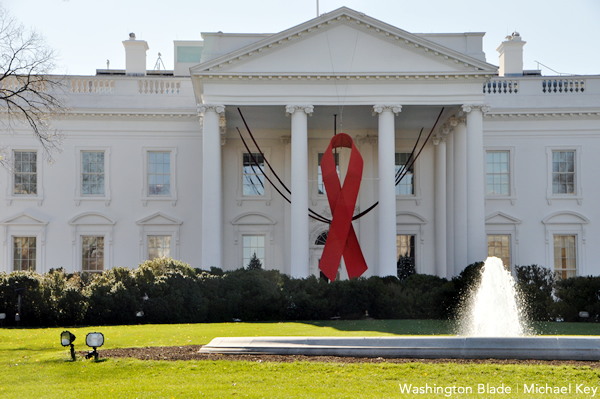
GLAAD has identified and catalogued LGBTQ+-inclusive content or references to HIV that appear on WhiteHouse.gov and the websites for several federal government agencies, anticipating that these pages might be deleted, archived, or otherwise changed shortly after the incoming administration takes over on Monday.
The organization found a total of 54 links on WhiteHouse.gov and provided the Washington Blade with a non-exhaustive list of the “major pages” on websites for the Departments of Defense (12), Justice (three), State (12), Education (15), Health and Human Services (10), and Labor (14), along with the U.S. Equal Employment Opportunity Commission (10).
The White House web pages compiled by GLAAD range from the transcript of a seven-minute speech delivered by President Joe Biden to mark the opening of the Stonewall National Monument Visitor Center to a readout of a roundtable with leaders in the LGBTQ+ and gun violence prevention movements and the White House Office of National Drug Control Policy’s 338-page FY2024 budget summary, which contains at least a dozen references to LGBTQ+-focused health equity initiatives and programs administered by agencies like the Substance Abuse and Mental Health Services Administration.
Just days after Trump took office in his first term, news outlets reported that LGBTQ+ related content had disappeared from WhiteHouse.gov and websites for multiple federal agencies.
Chad Griffin, who was then president of the Human Rights Campaign, accused the Trump-Pence administration of “systematically scrubbing the progress made for LGBTQ+ people from official websites,” raising specific objection to the State Department’s removal of an official apology for the Lavender Scare by the outgoing secretary, John Kerry, in January 2017.
Acknowledging the harm caused by the department’s dismissal of at least 1,000 employees for suspected homosexuality during the 1950s and 60s “set the right tone for the State Department, he said, adding, “It is outrageous that the new administration would attempt to erase from the record this historic apology for witch hunts that destroyed the lives of innocent Americans.”
In response to an inquiry from NBC News into why LGBTQ+ content was removed and whether the pages would return, a spokesperson said “As per standard practice, the secretary’s remarks have been archived.” However, NBC noted that “a search of the State Department’s website reveals not much else has changed.”
White House
Biden to leave office revered as most pro-LGBTQ+ president in history
Long record of support from marriage to trans rights

President Joe Biden will leave the White House next week after leading what advocates consider to be the most pro-LGBTQ+ administration in American history.
The past four years offer a wealth of evidence to support the claim, from the passage of legislation like the landmark Respect for Marriage Act to the promotion of LGBTQ+ rights abroad as a cornerstone of U.S. foreign policy, impactful regulatory moves in areas like health equity for gay and trans communities, and the record-breaking number of gender and sexual minorities appointed to serve throughout the federal government and on the federal bench.
As demonstrated by the deeply personal reflections that he shared during an exclusive interview with the Washington Blade in September, Biden is especially proud of his legacy on LGBTQ+ rights and believes that his record reflects the bedrock principles of justice, equality, and fairness that were inculcated by his father’s example and have motivated him throughout his career in public life.
For instance, during a trip to New York in June, where he delivered remarks to commemorate the opening of the Stonewall National Monument Visitor Center, Biden explained he was deeply moved by the “physical and moral courage” of those early gay rights activists, adding that the monument honoring their sacrifices “sets an example” in the U.S. and around the world.
Likewise, Biden told the Blade he decided to publicly express his support for same-sex marriage in the midst of his reelection campaign with then-President Barack Obama in 2012 because of his experience attending an event hosted by a gay couple with their children present.
“If you saw these two kids with their fathers, you’d walk away saying, ‘wait a minute, they’re good parents,’” he said. From that moment forward, Biden was unwilling to continue to demur, even if that meant preempting Obama’s “evolution” toward embracing marriage equality.
To fully appreciate Biden’s leadership — especially during his presidency, and particularly on issues of transgender rights — it is worth considering his record against the backdrop of the broader political landscape over the past four years.
By the time he took office in 2021, conservative activists and elected leaders had positioned the trans community at the center of a moral panic, introducing hundreds of laws targeting their rights and protections and exploiting the issue as a strategy to undermine support for Democrats.
In the face of unrelenting attacks from his Republican political adversaries, Biden set to work building an administration that “looked like America” including with the appointment of trans physician and four-star officer Dr. Rachel Levine to serve as assistant health secretary, and on day one he issued an executive order repealing his predecessor’s policy that excluded trans Americans from military service.
As the 2024 election neared, with Donald Trump’s campaign weaponizing transphobia as a wedge to score votes, Biden’s support remained vocal and sustained. In each of his four State of the Union addresses to joint sessions of Congress, for example, the president reinforced his commitment to “have the trans community’s back.”
Meanwhile, midway through his term the U.S. Supreme Court overturned abortion protections that were in place since Roe v. Wade was decided in 1973, with conservative statehouses across the country taking the opportunity to pass draconian restrictions.
Democrats sought to exploit the unpopular abortion bans, especially as the presidential race was in full swing, but many were concerned that Biden might be an ineffective messenger because of his personal opposition to the practice as a devout Catholic.
While he directed his administration to take measures to protect access to abortion in the U.S. and spoke publicly about the importance of reproductive autonomy and the freedom to access necessary medical care for family planning, the Associated Press reports that as of March 2024, Biden had only used the word “abortion” in prepared remarks once in four years.
The daylight between how the president has talked about transgender rights and how he has talked about abortion offers an interesting contrast, perhaps illuminating how impervious Biden can be when pressured to compromise his values for the sake of realizing his political ambitions, while also demonstrating the sincerity of his conviction that, as he put it in 2012, anti-trans discrimination is “the civil rights issue of our time.”
Biden was scheduled to deliver a farewell address to the nation on Wednesday evening.
-

 Commentary3 days ago
Commentary3 days agoThe perfect storm: Our queer infrastructure is in crisis
-

 a&e features4 days ago
a&e features4 days ago“I should have been there”: A queer Korean adoptee finds healing with original family members
-
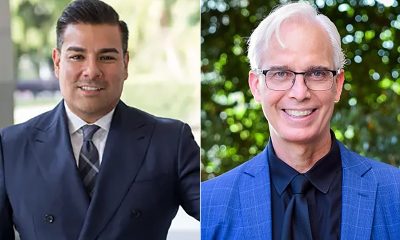
 California4 days ago
California4 days agoRicardo Lara, John Heilman inducted into Victory Institute’s Hall of Fame
-
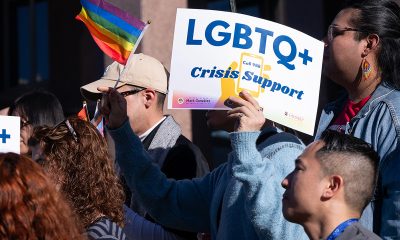
 LGBTQ+ Youth Mental Health3 days ago
LGBTQ+ Youth Mental Health3 days agoL.A. County officials advocate to reinstate “Press 3” crisis hotline for young queer people
-

 Television2 days ago
Television2 days ago‘Heated Rivalry’ is the gay hockey romance you didn’t know you needed
-

 Los Angeles1 day ago
Los Angeles1 day agoRecent L.A. County report reveals record number of hate crimes against transgender and nonbinary community members
-

 Commentary2 days ago
Commentary2 days agoLove in the time of porn: a glimpse into the dating life of an adult performer
-

 Music & Concerts1 day ago
Music & Concerts1 day agoSalina EsTitties and GMCLA are primed and ready for this weekend’s ‘Holiday Legends’
-

 Health7 hours ago
Health7 hours agoChoose U ambassadors share lived experiences with HIV, personal reflections, and insights

